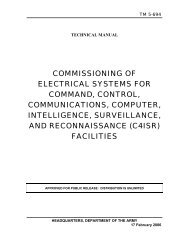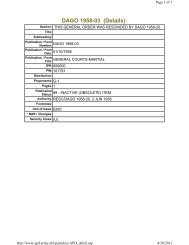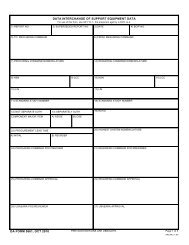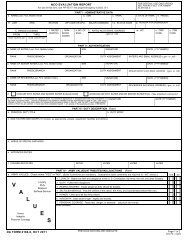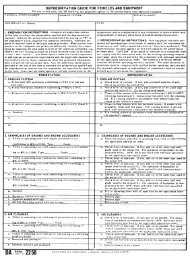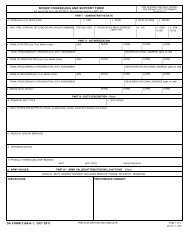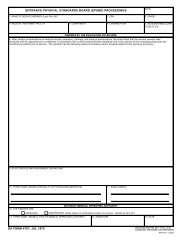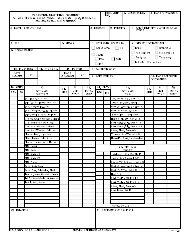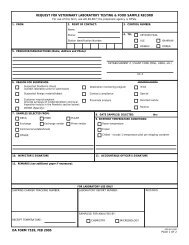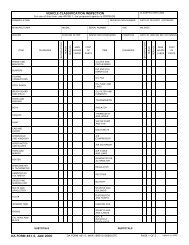FM 3-34.22 - Army Electronic Publications & Forms - U.S. Army
FM 3-34.22 - Army Electronic Publications & Forms - U.S. Army
FM 3-34.22 - Army Electronic Publications & Forms - U.S. Army
You also want an ePaper? Increase the reach of your titles
YUMPU automatically turns print PDFs into web optimized ePapers that Google loves.
Chapter 8<br />
Attainability<br />
8-19. Attainability involves generating the minimum-essential supplies and services necessary to begin<br />
operations. Commanders determine the minimum levels of support acceptable to initiate operations.<br />
Engineers, in conjunction with logisticians, complete the logistics estimate and initiate resource<br />
identification based on the supported commander’s requirements and priorities. An operation should not<br />
begin until minimum-essential levels of support are on hand.<br />
8-20. For engineers, attainability is at the very core of decisions. Trade-offs may be necessary to attain a<br />
given goal or quality of product. While attainable, the cost may make other things unattainable. Since<br />
engineer materiel must meet specific technical requirements, engineers work closely with the logistics staff<br />
to help them understand these requirements and obtain acceptable and suitable alternatives when trade-off<br />
decisions are required.<br />
Sustainability<br />
8-21. The engineer commander needs continuous logistics capability to gain and maintain initiative.<br />
Pauses for rebuilding power impede momentum and rob the command of initiative. Engineer planners<br />
synchronize all sustainment assets to ensure that the support operation does not impede the engineer<br />
commander. Continuous operations are critical to success.<br />
8-22. Sustainability ensures the longevity of logistics support to engineers throughout the AO for the<br />
duration of the operation. Sustainability focuses on the engineer commander’s attention for long-term<br />
objectives and the engineer force capabilities. Long-term support is a challenge for the engineer staff,<br />
which must not only attain the minimum-essential materiel levels to initiate operations, but must also<br />
sustain those operations through the end state. The ENCOORD must ensure that logistics requirements are<br />
known and flowing based on available transportation assets.<br />
8-23. Engineers are committed to the current operation or preparing for the next one. The tempo of the<br />
operation requires a constant vigilance by the logistician and engineer commander to ensure a constant<br />
flow of support. Supplies are pushed (unit distribution method) forward when logistically feasible.<br />
Maneuver units rely on lulls in the tempo of an operation to conduct sustainment operations, while<br />
engineers may not. Engineers do not usually have this opportunity since many of their missions occur<br />
during a lull in operations, and this may deny them the opportunity to use the supply point method. This<br />
increases the need for engineers to plan for continuous, routine, and emergency logistics support.<br />
8-24. General engineering involves constructing, repairing, operating, and maintaining infrastructure and<br />
facilities to enhance sustainment provisions and services (see <strong>FM</strong> 3-34.400). Contracting support obtains<br />
and provides supplies, services, and construction labor and materiel, often providing a responsive option or<br />
enhancement to support the force (see <strong>FM</strong> 3-100.21, <strong>FM</strong> 100-10-2, and <strong>FM</strong>I 4-93.41). General engineers<br />
and, potentially, USACE personnel may be required to provide subject matter expertise for the supervision<br />
of contracted materiel and services.<br />
Survivability<br />
8-25. Survivability is based on being able to protect support functions from destruction or degradation.<br />
Engineers contribute to ensuring that sustainment means are survivable by constructing sustainment bases<br />
and clearing LOCs.<br />
Economy<br />
Note. The logistics principle of survivability is related to, but not exactly the same as, the<br />
discussion of survivability operations in <strong>FM</strong> 5-103.<br />
8-26. Economy is providing the most efficient support to accomplish the mission. Economy reflects the<br />
reality of resource shortfalls, while recognizing the inevitable friction and uncertainty of military<br />
operations. This requires commanders to set clear priorities in the resource allocation. The priority of effort<br />
is established while balancing the mitigation of risk to the operation. Engineer commanders may have to<br />
improvise to meet the higher intent and mitigate the risks.<br />
8-4 <strong>FM</strong> 3-<strong>34.22</strong> 11 February 2009



